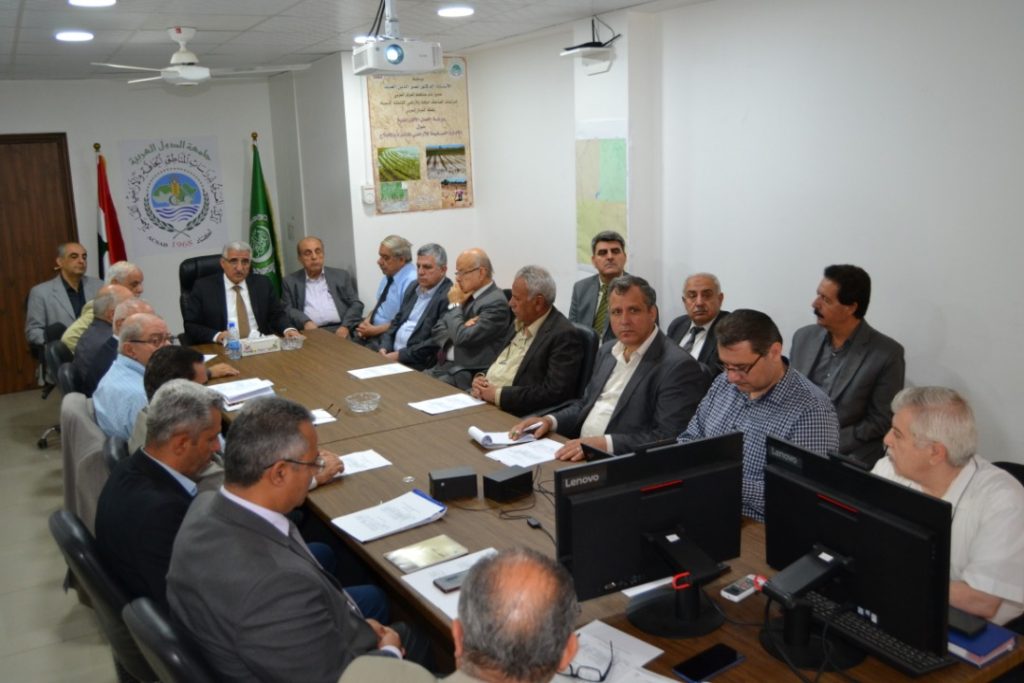The ACSAD Organisation / A workshop on the sound management of the lands affected by saline

Today, a virtual workshop on “the Sound Management of the Lands Affected by Saline” has been launched in the Arab Center for the Studies of Arid Zones and Drylands with the participation of 52 scientists and researchers from universities of different Arab countries, Ministries of Agriculture, and several of international and Arab organisations.
This two-day workshop discusses crucial scientific points, including presenting the new research results of the use of modern technologies and means of the sound management of the lands affected by saline, the adaptation to the soil salinity, and working on increasing the productivity of the saline lands.
The Director-General of the Arab Centre for the Studies of Arid Zones and Drylands ACSAD, H.E Dr Naser Edin Obeid, called for preserving land resources, restoring the degraded ones, and increasing their productivity to provide more food for the Arab people. He spoke: “This workshop aims to shed light on this issue and contribute to addressing it, working together to limit the expansion happened in the soil areas affected by saline as well as guiding their usage, avoiding the deterioration, and improving the productive characteristics of theirs to increase and sustain of their efficiency.”
He explained that the problem of saline accumulation in the soil is one of the most crucial and dangerous ones facing the agricultural process and food security at the Arab and global levels due to the spacious agrarian lands affected by the saline accumulation and the direct negative impact on the growth of plants produced the primary nutrition materials for human life in those countries. He also emphasized that studies indicate that about 1.5 million hectares of agricultural land turned to be non-agrarian annually due to being salinised; the financial loss is estimated at 31 billion dollars regarding the irrigating lands also suffer from salinity at about 20% per year and grow to reach 30% in the dry and semi drylands.
Dr Obeid also clarified that studies indicate too that more than 35 million hectares of agricultural lands in the Arab world are affected dramatically by saline processes; moreover, more than 80 arable hectares turn to be unproductive daily due to the saline accumulation resultant from the misuse of management and inappropriate environmental conditions, which led to more than 795 million capita are suffering hunger.
He added that applying scientific awareness and activating the governance approach for all, especially the decision-makers and those who deal with land resources, is the sound method that meets our goals and guidance toward integral agriculture development, the sound management of ecological systems alongside what is appropriate with the global trends toward neutralizing land degradation, the green economy, and adopting the general principles of the United Nations to restore ecological systems 2021 – 2030. He said: “This is what makes ACSAD adopt scientific programs and applicable projects to classify soils, land reclamation, combat desertification, and limit the various dangers of land degradation including soil salinised, improving the uses of untraditional water in cultivation as well as the saline and mid-saline water.
At last, ACSAD’s Director-General emphasized that the Arab Centre now is working on preparing a saline soils encyclopedia in the Arab world in cooperation with some Arab countries participating in this workshop. He said: “Our organisation keens on in its various activities to achieve SDGs, especially the second, sixth, thirteenth, fifteenth, seventeenth ones related to against hunger, adaptation to climate changes restoring ecological systems, the sustainable usage of natural resources, and activating the global participatory represented by building bridges with national institutions concerned in the Arab countries as well as the regional and international organisations, in addition to enhancing the efforts aiming to develop the scientific agricultural research in the Arid and semi-arid areas, conveying and settlement the modern agricultural technologies in order to grow the agrarian production in these areas, and building a solid network of work relations with the Arab and international institutions for the integral coordination among us to implement the tasks of inclusive agricultural and socio-economic development widely.




